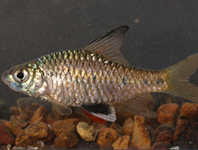Abstract
A third species of the southern temperate tabanomorph genus Austroleptis Hardy, 1920 (Diptera: Austroleptidae)—A. camposgerais sp. nov.—from the Brazilian Atlantic Forest is described and illustrated. A key for the species of the genus in Brazil is provided. Shared derived features indicate a sister group relationship between the new species and A. longirostris Fachin et al., 2018. Whatever the relationships among the species of this clade, however, there is a process of endemism within endemism in the Atlantic Forest: species at higher altitudes undergo vicariance process that do not affect lowland species distributed around the mountain chains. The low number of specimens known from highland species and the very restricted geographic distribution of each species strongly indicate the urgency to protect the natural environments at higher altitudes in Brazil.
References
Amorim, D.S. & Rindal, E. (2007) A phylogenetic study of the Mycetophiliformia, with creation of the subfamilies Heterotrichinae, Ohakuneinae, and Chiletrichinae for the Rangomaramidae (Diptera, Bibionomorpha). Zootaxa, 1535, 1–92.
https://doi.org/10.11646/zootaxa.1535.1.1
Amorim, D.S. & Santos, C.M.D. (2017) Flies, endemicity, and the Atlantic Forest: a biogeographical study using topographic units of analysis. Australian Systematic Botany, 30, 439–469.
https://doi.org/10.1071/SB16057
Bockmann, F.A., Rodrigues, M.T., Kohsldorf, T., Straker, L.C., Grant, T., Pinna, M.C.C., Mantelatto, F.L.M., Datovo, A., Pombal Jr., J.P., McNamara, J.C., Almeida, E.A.B., Klein, W., Hsiou, A.S., Groppo, M. Castro, R.M.C. & Amorim, D.S. (2018) Brazilian government attacks biodiversity. Science, 360 (6391), 865.
https://doi.org/10.1126/science.aat7540
Brown, B.V. (1993) A further chemical alternative to critical- point-drying for preparing small (or large) flies. Fly Times, 11, 10.
Cavarzere, V., Albano, C., Tonetti, V.R., Pacheco, J.F., Whitney, B.M. & Silveira, L.F. (2005) An overlooked hotspot for birds in the Atlantic Forest. Papéis Avulsos de Zoologia, 59, e20195905.
https://doi.org/10.11606/1807-0205/2019.59.05
Colless, D.H. (1963) New species of Ohakunea and related new genus with notes on the relationships of Heterotricha Loew (Diptera). Proceedings of the Linnean Society of New South Wales, 87, 303–308.
Cumming, J.W. & Wood, D.M. (2017) Chapter 3. Adult morphology and Terminology. In: Kirk-Spriggs, A.H., Sinclair, B.J. (Eds.), Manual of Afrotropical Diptera. Vol. 1. Introductory chapters and key to Diptera families. Suricata 4. South African Nacional Biodiversity Institute, Pretoria, pp. 89–133.
Escobar, H. (2019) Brazilian institute head fired after clashing with nation’s president over deforestation data. Science, 4 August 2019. [published online]
https://doi.org/10.1126/science.aay9857
Fachin, D.A., Santos, C.M.D. & Amorim, D.S. (2018) First two species of Austroleptis Hardy (Diptera: Brachycera: Austroleptidae) from Brazil. Zootaxa, 4369 (4), 557–574.
https://doi.org/10.11646/zootaxa.4369.4.6
Falaschi, R.L. & Amorim, D.S. (2009) Review of the Neotropical species of Nervijuncta Marshall, 1896 (Diptera, Ditomyiidae). Zootaxa, 2219 (1), 18–30.
https://doi.org/10.11646/zootaxa.2219.1.2
Hammoud, M., Santos, C.M.D. & Gois, J.P. (2019) iTUPA: an online automated application to perform Topographic-Unit Parsimony Analysis. Bioinformatics, 35 (22), 4818–4820.
https://doi.org/10.1093/bioinformatics/btz487
Hardy, G.H. (1920) Australian Rhyphidae and Leptidae (Diptera). Papers and Proceedings of the Royal Society Tasmania, 1919, 117–129.
https://doi.org/10.5962/bhl.part.21285
Henao-Sepúlveda, A.C., Wolff, M. & Amorim, D.S. (2019) Revision of the Neotropical Neuratelia Rondani (Diptera, Mycetophilidae, Sciophilinae): two new species, a new combination, and a new synonym. Zookeys, 861, 63–79.
https://doi.org/10.3897/zookeys.861.32835
Iganci J.R.V., Heiden, G, Miotto, S.T.S. & Pennington, R.T. (2011) Campos de Cima da Serra: the Brazilian Subtropical Highland Grasslands show an unexpected level of plant endemism. Botanical Journal of the Linnean Society, 167, 378–393.
https://doi.org/10.1111/j.1095-8339.2011.01182.x
iNaturalist (2020) California Academy of Sciences & National Geographic Society. Available from: https://www.inaturalist.org/ (accessed 8 June 2020)
Kerr, P.H. (2010) Phylogeny and classification of Rhagionidae, with implications for Tabanomorpha (Diptera: Brachycera). Zootaxa, 2592 (1), 1–133.
Külkamp, J., Heiden, G. & Iganci, J.R.V. (2018) Endemic plants from the Southern Brazilian Highland Grasslands. Rodriguésia, 69 (2), 429–440.
https://doi.org/10.1590/2175-7860201869214
Malloch, J.R. (1932) Part V, fascicle 3.—Rhagionidae (Leptidae), Therevidae, Scenopinidae, Mydaidae, Asilidae, Lonchopteridae. In: British Museum (Org.), Diptera of Patagonia and South Chile. British Museum of Natural History, London, pp. 199–257.
Mallet-Rodrigues, F., Parrini, R., Pimentel, L.M.S. & Bessa, R. (2010) Altitudinal distribution of birds in a mountainous region in southeastern Brazil. Zoologia, 27, 503–522.
https://doi.org/10.1590/S1984-46702010000400003
Marshall, P. (1896) New Zealand Diptera. No. 2.—Mycetophilidae. Transactions of the New Zealand Institute, 28, 250–309.
McAlpine, D.K. & Keyzer, R.G. (1994) Generic classification of the fern flies (Diptera: Teratomyzidae) with a larval description. Systematic Entomology, 19, 305–326.
https://doi.org/10.1111/j.1365-3113.1994.tb00593.x
Mira-Mendes, C.B., Ruas, D.S., Oliveira, R.M., Castro, I.M., Dias, I.R., Baumgarten, J.E., Juncá, F.A. & Solé, M. (2018) Amphibians of the Reserva Ecológica Michelin: a high diversity site in the lowland Atlantic Forest of southern Bahia, Brazil. ZooKeys, 753, 1–21.
https://doi.org/10.3897/zookeys.753.21438
Nagatomi, A. (1984) Male genitalia of the lower Brachycera (Diptera). Beiträge zur Entomologie, 34, 99–157.
Nagatomi, A. (1991) History of some families of Diptera, chiefly those of the Lower Brachycera (Insecta: Diptera). Bulletin of the Biogeographical Society of Japan, 46, 21–37.
Nagatomi, A. & Itawa, K. (1976) Female terminalia of lower Brachycera (Diptera)—I. Beiträge zur Entomologie, 26, 5–47.
Nagatomi, A. & Nagatomi, H. (1987) The genus Austroleptis from south Chile and Patagonia (Diptera, Rhagionidae). Memoirs of the Kagoshima University Research Center for the South Pacific, 8, 139–156.
Paramonov, S.J. (1962) A review of the Australian Leptidae (Diptera). Australian Journal of Zoology, 10, 113–169.
https://doi.org/10.1071/ZO9620113
Skuse, F.A. (1888) Diptera of Australia. Part III. Proceedings of the Linnean Society of New South Wales, Series 12, 2 (3), 1123–1222.
Stuckenberg, B.R. (2001) Prunning the tree: a critical review of classifications of the Homeodactyla (Diptera, Brachycera), with new perspectives and an alternative classification. Studia Dipterologica, 8, 3–42.


